American Catholic History
Telling the stories of Catholics on these American shores from 1513 to today. We Catholics have such an incredible history in what are now the 50 states of the United States of America, and we hardly know it. From the canonized saints through the hundred-plus blesseds, venerables, and servants of God, to the hundreds more whose lives were sho-through with love of God, our country is covered from sea to shining sea with holy sites, historic structures, and the graves of great men and women of faith. We tell the stories that make them human, and so inspiring.
Episodes
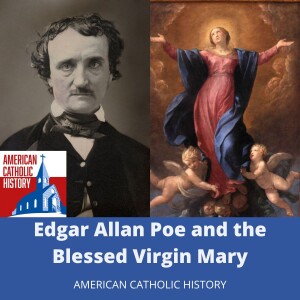
Thursday Oct 31, 2024
Thursday Oct 31, 2024
Edgar Allan Poe is one of the most important early American wrters. He is known for horror, the macabre, suspense, and other dark themes. Poe was important in the development of science fiction and he invented the detective novel. But what is less well-known is his interesting knowledge of and interest in Catholicism. In an age where typical Protestants either wouldn’t have an idea of what Catholics actually believe, or wouldn’t be interested in presenting Catholicism in an honest light, Poe did both. And in one short story he even wrote a rather lovely poem that amounts to a prayer to the Blessed Mother. The poem, known as “Hymn,” invokes the aid of the Blessed Mother and has strong intercessory language. Later in his life, Poe lived in a cottage near the campus of St. John College at Fordham (known today as Fordham University) where he came to know and spend much time with the Jesuits who ran that school. He died in unfortunate and mysterious circumstances in 1849 at just 40 years old.
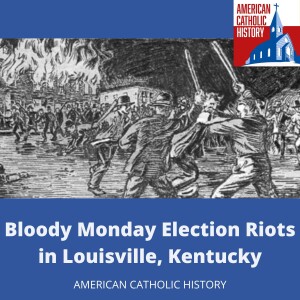
Monday Oct 28, 2024
Monday Oct 28, 2024
Election Day, August 6, 1855, is known as Bloody Monday in Louisville, Kentucky. The Know Nothings used violence to try to keep Catholics from voting, and the violence turned into riots. By the end of the day 22 were confirmed dead, though the number of dead was likely over 100. Learn more about this awful day in Louisville, which played a role in Louisville falling behind other cities along the Ohio and Mississippi rivers, like Cincinnati and St. Louis, in terms of population and economic importance.
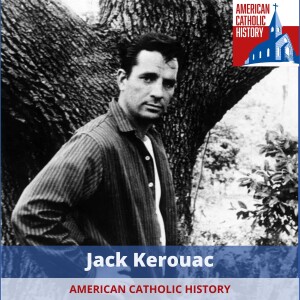
Thursday Oct 24, 2024
Thursday Oct 24, 2024
Jack Kerouac was born in 1922 in Lowell, Massachusetts to Catholic parents. When he was four his saintly elder brother, Gerard, died tragically. His mother became more devout, but his father abandoned the faith and drank heavily. This childhood trauma affected the rest of his life, and he stopped going to Mass in his teens. After dropping out of college he began to write while in the military. In the late 1940s he and his friends, through their artistic and literary output, began the Beat Generation, signifying how their generation felt “beaten down” by the world. In 1951, Kerouac wrote his most important work, On the Road, but it wasn’t published until 1957. But through it all, what he was looking for was God. In the 1960s he returned, in stages, to the Catholicism of his youth, fully returning to the faith by the end of the decade. He died in 1969 as a result of a lifetime of heavy drinking.
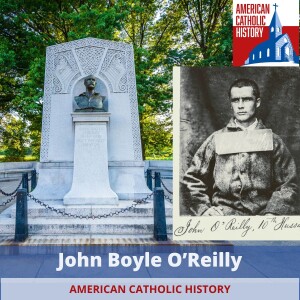
Monday Oct 21, 2024
Monday Oct 21, 2024
Born just before the potato famine ravaged Ireland, John Boyle O’Reilly grew up in an Ireland still dominated by England. His father was a schoolmaster, so John and his siblings received an excellent education. He was very outgoing, made friends easily, and was a natural leader. He became a journalist, and then a soldier. He also joined the Irish Republican Brotherhood — the Fenians — who were bent on revolution and the end of British rule of Ireland. Eventually arrested for treason, O’Reilly was sentenced to "transportation" and was sent to a penal colony in Australia. He escaped from that colony in epic fashion, arriving in Boston in 1870. He got a job as a reporter with the Boston Pilot, eventually becoming part owner and publisher. He used the pages of the Pilot to advocate for civil rights for all. He became a very respected journalist, poet, speaker, author, and activist. His sudden death at 46 years old shocked Boston and beyond.
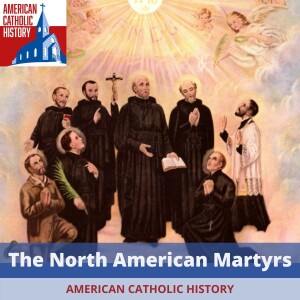
Thursday Oct 17, 2024
Thursday Oct 17, 2024
Sts. Isaac Jogues, Rene Goupil, and John de Lalande were three of the eighte North American Martyrs. In Canada this group is known as the Canadian Martyrs. Rene Goupil was the first to be martyred, earning that crown in 1642 after teaching some Mohawk children how to make the Sign of the Cross in the village of Ossernenon, west of present day Albany, New York. Isaac Jogues, who had been tortured around the time of Goupil's death, was martyred in 1646, with John de Lalande following him in death soon after. These Jesuits shed their blood for Christ on this continent.
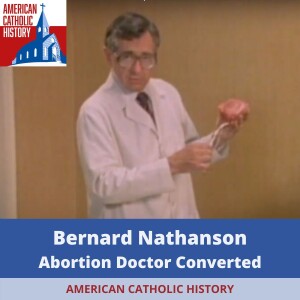
Monday Oct 14, 2024
Monday Oct 14, 2024
Bernard Nathanson helped co-found NARAL an was responsible for 75,000 abortions, including 5,000 he did with his own hands. But with the advent of advanced imaging technology that allowed a more clear view of the fetus in the womb, he began to realize the humanity of the unborn child, and by the end of the 1970s he had fully accepted that abortion is wrong. He became an ardent pro-life, anti-abortion advocate, but was an atheist through the 1980s. In the 1990s, however, his quest for forgiveness and absolution of his many evil deeds led him to become Catholic in 1996. He died in 2011.
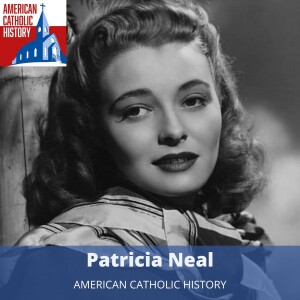
Thursday Oct 10, 2024
Thursday Oct 10, 2024
Patricia Neal’s Hollywood career began the same year she met Gary Cooper and started an affair with him. That affair had a profound impact on the rest of her life. She had an abortion, and lived with the pain of the relationship gone bad for decades. She married British author Roald Dahl and they had five children. But tragedy struck two of her children and herself, and then Dahl asked for a divorce after she found out he’d been having an affair. She was living with a lot of pain. But in the meantime she had a reconciliation with Gary Cooper’s wife and daughter, Maria, after Maria reached out to her with forgiveness and a desire to mend fences. Eventually Neal found peace and solace at the Regina Laudis Abbey — home to Mother Dolores Hart — which she visited at the suggestion of Maria Cooper. Eventually, after experiencing much healing and peace, she became Catholic and after her death was buried at Regina Laudis.
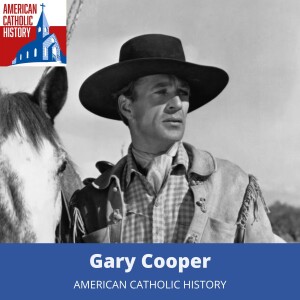
Monday Oct 07, 2024
Monday Oct 07, 2024
Gary Cooper was one of the greatest actors in Hollywood history. His strong, understated, good-natured characters established a paradigm, especially for Western heroes. He won two Oscars for Best Actor, while acting in 84 films over 36 years. But his off-screen life wasn’t quite as virtuous and praiseworthy. He had a significant problem with philandering, which continued even after he got married. His wife, Veronica “Rocky” Balfe, was Catholic, and eventually her strong faith, and that of their daughter Maria, encouraged him to consider becoming Catholic and turning over a new leaf. By the time cancer came for him in 1961, he had become Catholic, left his womanizing ways behind, and embraced fully the life of the Sacraments.
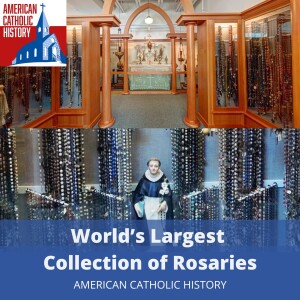
Thursday Oct 03, 2024
Thursday Oct 03, 2024
Donald Brown wasn't Catholic when he became fascinated with the Rosary. A bad bout of pneumonia when he was young put him in a hospital run by Sisters of Mercy in the early 1900s. In 1917 he began to collect rosaries. In 1929 he became Catholic. Over the decades he collected about 4,000 rosaries before his death in 1975 at 80 years old. His rosaries include some connected to Sister Lucia, one of the visionaries of Fatima, Governor Al Smith, Padre Pio, President John F. Kennedy, Robert F. Kennedy, Father Flanagan of Boys Town, Lou Holtz, and others. They range in size from the size of a thimble to 16 feet long. They are made from everything from precious gems to pieces of bone to foam balls. The collection occupies the top floor of the Columbia Gorge Museum in Stevenson, Washington, 45 minutes east of Portland, Oregon.
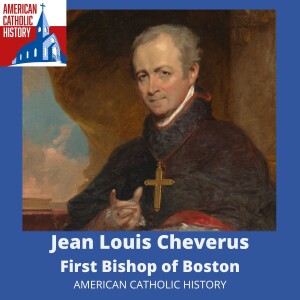
Monday Sep 30, 2024
Monday Sep 30, 2024
Jean Louis Cheverus was a remarkable man and the first bishop of Boston. He was another of the many bishops, priests, and religious who fled France due to the French Revolution and made a tremendous impact on the Church in America.
During his 27 years in New England he changed things dramatically. When he arrived, Catholics were a definite minority, and a reviled one at that. But through his tireless ministry, good humor, erudition, and holiness, he won over many previously hostile protestants, and became a friend to John Adams, Josiah Quincy, and many other prominent protestants. His counsel was sought by legislators. He aided in establishing the first chartered savings bank in the U.S. He worked tirelessly among all of his flock, no matter their social status or race. He established the first two parishes in New England, including St. Patrick for Penobscot and Irish in New Castle, Maine.
His sudden departure in 1823 when he was named bishop of Montauban in his native France saddened everyone.
But he left a lasting legacy on Boston and New England.










